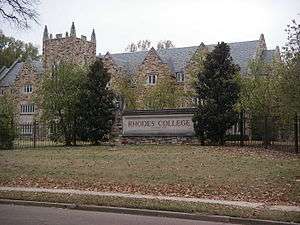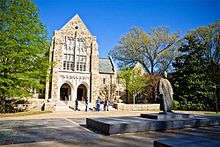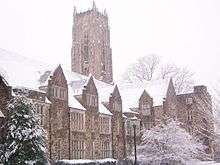Rhodes College
Coordinates: 35°09′21″N 89°59′28″W / 35.1558°N 89.9910°W
 | |
| Motto | Truth, Loyalty, Service |
|---|---|
| Type | Liberal arts college |
| Established | 1848 |
| Endowment | $335 million[1] |
| President | William E. Troutt |
Academic staff | 210 |
| Undergraduates | 2,030 |
| Postgraduates | 21 |
| Location | Memphis, Tennessee, United States |
| Campus | Urban, 100 acres (400,000 m²) |
| Colors |
Cardinal & Black |
| Athletics | NCAA Division III, SAA |
| Nickname | Lynx |
| Website |
www |
 | |

Rhodes College is a private, predominantly undergraduate, liberal arts college located in Memphis, Tennessee. Affiliated with the Presbyterian Church (USA), Rhodes is accredited by the Southern Association of Colleges and Schools and enrolls approximately 2,000 students.
History
Rhodes College was founded in 1848 in Clarksville, Tennessee as the Masonic University of Tennessee (and briefly as Montgomery Masonic College), the Institution was renamed Stewart College in 1850 in honor of its president, William M. Stewart. Under Stewart's leadership in 1855, control of the college passed to the Presbyterian Church. In 1875, the college added an undergraduate School of Theology and became Southwestern Presbyterian University. The School of Theology operated until 1917.
In 1925, president Charles Diehl led the move to the present campus in Memphis, Tennessee (the Clarksville campus later became Austin Peay State University). The college shortened its name to Southwestern. In 1945, the college adopted the name Southwestern at Memphis, to distinguish itself from other colleges and universities containing the name "Southwestern."
Finally, in 1984, the college's name was changed to Rhodes College to honor former college president, and Diehl's successor, Peyton Nalle Rhodes.[2] Since 1984, Rhodes has grown from a regionally recognized institution to a nationally ranked liberal arts college.[3] As enrollment has increased over the past 20 years, so has the proportion of students from outside Tennessee and the Southeast region.[4] in 2016 the Princeton Review named Rhodes College "the #1 most beautiful college campus in America."
Dr. James Daughdrill served as president for over a quarter century, from 1973 to 1999. His successor is Dr. William E. Troutt, the 19th president of the college. On 14 April Dr. Troutt announced that the Board of Trustees had accepted his retirement date of June 2017, at which time he will have been president of Rhodes for 18 years, and have spent 35 years as a college president.
Academics

The academic environment at Rhodes centers around small classes and an emphasis on student research and writing. Students are encouraged to participate in off-campus activities and "service learning". They are also given the opportunity to participate in a variety of research-based programs, such as the Summer Plus program at St. Jude Children's Research Hospital, the Rhodes Institute for Regional Studies, the Center for Outreach and Development of the Arts, the Mike Curb Institute for Music, and the Rhodes Service Fellows program.
About one third of Rhodes students go on to graduate or professional school.[5] The acceptance rates of Rhodes alumni to law and business schools are around 95%, and the acceptance rate to medical schools is nearly twice the national average.[6]
Rhodes is featured in Loren Pope's Colleges That Change Lives[7] and on the cover of the 2008 Princeton Review Complete Book of Colleges.[8] U.S. News & World Report consistently ranks Rhodes among the nation's "top-tier" liberal arts colleges, ranking the school 47th among liberal arts colleges in 2010.[9] Forbes rated Rhodes 47th among all American colleges and universities in its 2010 publication of America's Best Colleges[10] Rhodes has been home to a chapter of the Phi Beta Kappa Society since 1949, one of 283 chapters nationwide.
Campus

The campus covers a 100-acre (0.40 km2) tract in Midtown, Memphis across from Overton Park and the Memphis Zoo. Often cited for its beauty,[11] the campus design is notable for its stone Gothic architecture buildings, thirteen of which are currently listed on the National Register of Historic Places.[12]
When the entirely white Hein Park district adjacent to campus walled off access to the neighborhood through West Drive, predominately black neighbors from across Jackson Avenue sued under the Civil Rights Act of 1866.[13] In 1981 a narrowly divided U.S. Supreme Court found the barrier was legal, although dissenting Justice Thurgood Marshall admonished that "a group of white citizens has decided to act to keep Negro citizens from traveling through their urban 'utopia' and the city has placed its seal of approval on the scheme".[14]
The original buildings, including Palmer Hall (1925), Kennedy Hall (1925), and Robb and White dormitories (1925), were designed by Henry Hibbs in consultation with Charles Klauder, who designed many buildings at Princeton University, alma mater of college president Charles Diehl.
Later buildings were designed by H. Clinton Parrent, a young associate of Hibbs who was present from the beginning. Parrent's buildings include the Catherine Burrow Refectory (1957), which was an expansion of Hibbs' original dining hall. Parrent also added Halliburton Tower (1962) to Palmer Hall. The 140-foot (43 m) bell tower was named in honor of explorer Richard Halliburton. The Paul Barret, Jr. Library holds a collection of Halliburton's papers.[15]
Rhodes maintains its Collegiate Gothic architecture. The latest example is the new West Village dormitory (2012).
The campus was used as the setting of the movie Making the Grade.[16]
Students and faculty
Rhodes' student body represents 46 states, the District of Columbia, and 11 foreign countries, and includes 20% students of color .The student-to-faculty ratio is 10:1.[17] Some of the approximately 30 majors include Economics and Business Administration, Biology, Political Science, English, and International Studies.
Traditions and clubs
Rhodes is one of 62 colleges recently classified for both "Curricular Engagement" and "Outreach & Partnerships" in the "Community Engagement" category by The Carnegie Foundation for the Advancement of Teaching. Approximately 80% of Rhodes students participate in some form of community service by the time they graduate.[18] The curriculum includes a requirement that students participate in activities that broaden the connection between classroom experiences and the outside world. The mission statement of the college also reinforces community engagement, aspiring to "graduate students with ... a compassion for others and the ability to translate academic study and personal concern into effective leadership and action in their communities and the world".[19]
Central to the life of the college is its Honor Code, administered by students through the Honor Council. Every student is required to sign the Code, which reads, "As a member of the Rhodes College community, I pledge my full and steadfast support to the Honor System and agree neither to lie, cheat, nor steal and to report any such violation that I may witness." Because of this, students enjoy a relationship of trust with their professors and benefits such as taking closed book final exams in the privacy of their own rooms.
Rites of Spring is a three-day music festival in early April. A major social event of the school year, it typically attracts several major bands from around the country. Rites to Play has in recent years brought elementary-school-age children to the campus. Rhodes students plan, organize, and execute a carnival for the children, who are sponsored by community agencies and schools that partner with Rhodes.
Athletics
The college mascot is the lynx and the school colors are red and black.
The athletic teams compete in the Southern Athletic Association in the NCAA's Division III. Men's sports include baseball, basketball, cross country, football, golf, lacrosse, soccer, swimming, tennis and track & field; while women's sports include basketball, cross country, field hockey, golf, lacrosse, soccer, softball, swimming, tennis, track & field and volleyball.
Rhodes has two athletic national championships to its credit, with the baseball team earning a title in 1961 and the women's golf team earning one in 2014.[20]
The J. Hal Daughdrill Award is given to the "Most Valuable Player" of the Lynx football team. The award honors James Harold Daughdrill, Sr. (1903–1986), outstanding football player, athlete, business leader, and the father of Rhodes' eighteenth President.[21] The Rebecca Rish Gay Award and Walter E. Gay Award are given to the "Athletes of the Year" and are named after the parents of former President Daughdrill’s wife, Libby Daughdrill.[22]
Mock trial
With four national championships and eight national final round appearances, Rhodes's undergraduate mock trial program is one of the most prestigious in the country. Founded in 1986 by Professor Marcus Pohlmann, Rhodes has qualified to the American Mock Trial Association's National Championship tournament every year since its inception, with twenty-seven top ten finishes and over seventy All-American attorney and witness awards.
At the 2013 AMTA National Championship tournament in Washington, D.C., Rhodes A earned the national runner-up spot while Rhodes B placed fifth in its division. The teams are currently ranked second and seventeenth in the nation, respectively.
Buckman Hall houses a replica courtroom used by the teams for practicing. Every spring, Rhodes hosts one of the six AMTA Opening Round Championship tournaments in the Shelby County Courthouse in downtown Memphis. The program also hosts an informal invitational scrimmage tournament in Buckman Hall every autumn.[23][24]
Greek system
There are a number of social fraternities and sororities at Rhodes. Approximately 50% of the students are members of Greek organizations. Fraternity and sorority lodges at Rhodes are not residential.
Sororities
(in order of establishment at Rhodes)
- Chi Omega 1922
- Alpha Omicron Pi 1925
- Kappa Delta 1925
- Delta Delta Delta 1931
Fraternities
(in order of establishment at Rhodes)
- Pi Kappa Alpha 1878
- Alpha Tau Omega 1881
- Kappa Sigma 1882
- Sigma Alpha Epsilon 1882
- Kappa Alpha Order 1887
- Sigma Nu 1934
Notable people
Faculty and administrators
- Mark Behr, South African novelist
- Susan Bies, Member of the Board of Governors of the Federal Reserve
- Andrew A. Michta, M. W. Buckman Distinguished Professor of International Studies
- Marcus Pohlmann, Political Scientist, founder and coach of the mock trial team
- Abu Ammaar Yasir Qadhi, Professor of religious studies, Islamic scholar
- William E. Troutt, President, former Chair of the American Council on Education and the National Commission on the Cost of Education and member of the Lincoln Commission on Study Abroad
- Robert Penn Warren, the Pulitzer Prize winning author of All The King's Men, began his teaching career at Rhodes in 1930[25]
- Allen Tate, American poet, essayist, social commentator, and Poet Laureate Consultant in Poetry to the Library of Congress
- James H. Daughdrill, Jr., 18th President of Rhodes College
- Bobby Rush (musician) – Blues Hall of Famer, Grammy nominee, visiting scholar in the arts
Alumni
Academia
- David Alexander '53 – President of Rhodes College and Pomona College[26]
- Julie Story Byerley, '92 – Pediatrician and Vice Dean for Education for the University of North Carolina at Chapel Hill School of Medicine[27]
- Lindley Darden, '68 – Professor of Philosophy, University of Maryland
- James C. Dobbins, '71 – James H. Fairchild Professor of Religion, Oberlin College
- Lee Giles, '68 – David Reese Professor of Information Sciences and Technology, Professor of Computer Science and Engineering, and Professor of Supply Chain and Information Systems, Pennsylvania State University
- Harry L. Swinney, '61 – Director of the Center for Nonlinear Dynamics at the University of Texas at Austin
- Mark D. West, '89 – University of Michigan Law School Dean, Nippon Life Professor of Law
- Carol Strickland, '68 – Art historian and author
Athletics
- Tom Mullady – New York Giants tight end, 1979 to 1984
Business
- John H. Bryan '58 – Former CEO of Sara Lee and member of the board of Goldman Sachs
Government and military
- Bill Alexander '57 – U.S. Congressman from Arkansas (1969–1993), Chief Deputy Majority Whip
- Theodore M. Brantley ~1880 – longest-serving Chief Justice of the Montana Supreme Court, serving for 23 years (1899–1922)
- Dustin Burrows '01 – Texas State Representative, District 83 (beginning January 13, 2015)[28]
- Catherine Eagles '79 – U.S. federal judge for the U.S. District Court for the Middle District of North Carolina
- Abe Fortas '30 – U.S. Supreme Court justice (1965–1969) and unsuccessful nominee for Chief Justice of the United States, authored the opinion in the 1969 case Tinker v. Des Moines School District
- Alison Lundergan Grimes 2001 – Secretary of State of Kentucky, 2012–present
- Claudia J. Kennedy '69 – first woman to hold a three-star rank in the U.S. Army, Lieutenant General, Deputy Chief of Staff for Intelligence, member of the Military Intelligence Hall of Fame
- Joseph Williams Vance, Jr. (1918–1942) – an officer in the United States Navy decorated with the Bronze Star Medal for action in the Battle of Makassar Strait during World War II during which he gave his life; attended Southwestern from 1936 to 1938; the U.S. Navy destroyer USS Vance (DE-387), which saw duty in the latter part of World War II, was named in his honor
Literature and the arts
- Anne Howard Bailey '45 – television writer
- Dixie Carter '62 – Emmy-nominated actress, starred in hit CBS sitcom Designing Women
- Carroll Cloar – Guggenheim Fellow and artist
- John Farris '58 – prolific writer of popular fiction and suspense novels, and stage and screen plays
- Charlaine Harris '73 – Best-selling mystery writer
- George Hearn '56 – two time Tony Award winning actor and singer
- Sarah Lacy '99 – technology journalist
- Hilton McConnico – film director
- Allison Miller – actress and singer
- Kelley Paul – writer, wife of US Senator Rand Paul
- Peter Matthew Hillsman Taylor '39 – Pulitzer Prize-winning author
- Verner Moore White '1884 – Noted landscape and portrait artist
Other
- Margaret Polk '43 - sweetheart of the pilot of the Memphis Belle B-17, after whom the plane was named
- Cary Fowler '71, Hon. '11 – American agriculturalist and the former Executive Director of the Global Crop Diversity Trust
- J. Vernon McGee '30 - Former pastor of the Church of the Open Door in Los Angeles and founder of Thru the Bible Radio Network.
See also
References
- ↑ "Sortable Table: College and University Endowments, 2013-14 - Administration". The Chronicle of Higher Education. 2015-01-29. Retrieved 2015-02-12.
- ↑ Michael Nelson. "Rhodes College". Tennessee Encyclopedia of History and Culture. Retrieved 2009-08-09.
- ↑ Pope, Loren, Colleges that Change Lives: 40 Schools That Will Change the Way You Think About Colleges, Penguin Books, New York, 2006, p. 181.
See also "Best Liberal Arts Colleges", America's Best Colleges, US News and World Report, 1999–2007. - ↑ data available via Integrated Postsecondary Education Data System (IPEDS), National Center for Education Statistics.
- ↑ Franek, Robert et al., The Best 361 Colleges: the Smart Student's Guide to Colleges, Random House, Inc., New York, 2006, p. 424.
- ↑ Pope, Loren, Colleges that Change Lives: 40 Schools That Will Change the Way You Think About Colleges, Penguin Books, New York, 2006, p. 185.
- ↑ Loren Pope (July 25, 2006). Colleges That Change Lives: 40 Schools That Will Change the Way You Think About Colleges. Penguin. p. 320. ISBN 978-0-14-303736-1.
- ↑ Complete Book of Colleges. Princeton Review. August 7, 2007. p. 1584. ISBN 978-0-375-76620-6.
- ↑ "National Liberal Arts College Rankings | Top Liberal Arts Colleges | US News Best Colleges". Colleges.usnews.rankingsandreviews.com. Retrieved 2012-01-16.
- ↑ "America's Best Colleges". Forbes. 5 August 2009.
- ↑ as in Turner South's Blue Ribbon, Princeton Review, Collegiate Gothic: The Architecture of Rhodes College by William Stroud, and other sources
- ↑ "Rhodes Recognized". Retrieved February 2009. Check date values in:
|access-date=(help) - ↑ Sarah Schindler,Architectural Exclusion: Discrimination and Segregation Through Physical Design of the Built Environment,124 YALE L.J. 1934 (2015).
- ↑ City of Memphis v. Greene, 451 U.S. 100, 155 (Marshall, J., dissenting).
- ↑ Archives & Special Collections, Rhodes College (Memphis, Tennessee). Accessed online 2 January 2008
- ↑ "Filming locations for Making the Grade". Retrieved January 2012. Check date values in:
|access-date=(help) - ↑ These figures are published in the Rhodes College Common Data Set
- ↑ Franek, Robert et al., The Best 361 Colleges: the Smart Student's Guide to Colleges, Random House, Inc., New York, 2006, p. 425.
- ↑ "Rhodes Vision". Retrieved February 2009. Check date values in:
|access-date=(help) - ↑ "Rhodes wins first team championship since 1961; Lynx never trailed". NCAA. Retrieved 19 September 2014.
- ↑ "Rhodes College Athletics". Rhodeslynx.com. Retrieved 2009-08-09.
- ↑ "Rhodes College Athletics - Vanaman and Farrell Named Athletes of the Year". Rhodeslynx.com. 2008-04-17. Retrieved 2009-08-09.
- ↑ "About Our Team". Rhodes College. Retrieved 19 September 2014.
- ↑ http://www.collegemocktrial.org/about-amta/history-/national-championship-trial-results/
- ↑ "Robert Penn Warren Biography". Retrieved 19 September 2014.
- ↑ "David Alexander (1932–2010)". Retrieved 19 September 2014.
- ↑ "Byerley appointed Vice Dean for Education". Vital Signs. UNC Health Care News. 2013-09-12. Retrieved 2015-04-13.
- ↑ http://www.burrows4texas.com/about_dustin
External links
| Wikimedia Commons has media related to Rhodes College. |